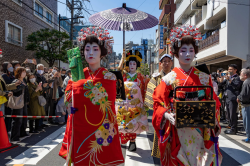

How the law was passed gives some credence to this idea. As Dr. Nakano points out: “The LDP deliberately forced it through the Diet, breaking the Diet’s own usual conventions for passing a bill. They realized that as time passes, the opposition’s outcry would increase, so they decided to ram it through before the opposition could build enough outcry or support.” Also, the context is important. Just before its passage, the government was chatting up the media about its desire to grow Japan’s military and revise its defense-only status. Just after the passing of this law, Prime Minister Abe suddenly visited the controversial Yasukuni Shrine. These events set off shouts of both support and outrage, and dominated media coverage from Shanghai to Shinjuku—effectively burying the Secrets law. These bookend events also stoked the growing wariness many in Japan have of their Asian neighbors, and frightened people who are more likely to support (even extreme) defensive measures. Was this timing coincidental or a deviously planned fear-mongering itinerary designed to distract the public and justify a controversial law? Regardless, the end result was the limited shelf life of the story and protests were kept to a minimum as the calendar entered the busy end-of-year holiday season.
It also makes sense that this law was passed just a few months after Tokyo was awarded the 2020 Summer Olympic Games, a not-too-distant event that could have been significant motivation in the government’s decision to push forth with this bill. Tourism has plummeted in Japan since the March 11 disasters, badly hurting the bottom lines of both the government and small businesses. That likely factored into Tokyo’s decision to pursue the Olympics at such cost, great effort and despite losing its 2009 bid for the 2016 Games. The International Olympic Committee’s stamp of approval is certain to register as an “all clear” signal for tourists who were scared off by radiation fears—effective immediately. However, that is far from enough to guarantee the Olympics will succeed in having the desired effect on Japan’s economy. Most recent host cities suffered major financial losses as a result of the Olympics, and any number of problems could arise between now and 2020 to threaten Tokyo’s success, beginning with the lingering problems in Fukushima.
Mr. Abe’s LDP was forced to defend the law in response to the understandably critical media, predictably invoking the “national security” justification while acting obligatorily offended that anyone would doubt the sincerity of their actions. Unfortunately, what they offered were merely hollow reassurances of what they would or wouldn’t do, rather than modifying what they can or can’t do under the law. LDP Secretary-General Shigeru Ishiba went one step further, throwing the “terrorist” label at those who would disagree with and protest the law. “The strategy of merely shouting one’s opinions at the top of one’s lungs,” he opines in a tone-deaf blog post, “is not so fundamentally different from an act of terrorism.”
Fortunately, the media remained persistent in its criticism and protest which, in January, led the government to compromise and establish an advisory panel and monitoring committee to act as overseers and watchdogs. These organizations have an extraordinary responsibility, but whether they balance the dangers of this law remains to be seen: watchdogs without sharp teeth are useless.
How far would the government go—and what are they willing to cover up—in the name of national security? In the name of a financially successfully Tokyo Olympics? Or in the name of winning the next election? Under this law, we’ll never know for sure. One thing we do know, however, and should never forget, is exactly what to think of people who ask us to trust them.
Public Proponents

“We support the evolution of Japan’s security policies, as they create a new national security strategy, establish a National Security Council, and take steps to protect national security secrets.”
This is what United States Ambassador to Japan Caroline Kennedy had to say in response to the State Secrets Law in one of her first public statements. While it’s true that the U.S. has called on Japan to shore up its frequent (though typically minor) information leaks to the media by government officials, Japan’s initial claim that the allure of increased information-sharing with the U.S. was the reason for the secrets law was both baseless and ridiculous. There has been no evidence of any plan or agreement between the countries based on the law’s passage. Experts have been rolling their eyes at the thought of U.S. intelligence opening up due to Japan’s improved ability to conceal its own actions. “It’s naive to think that the U.S. would share more information with Japan,” commented Dr. Koichi Nakano. The government has since abandoned that talking point in favor of its current “national security” justification.







